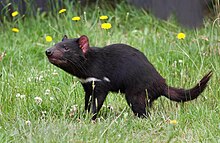
Back Tasmaniese duiwel Afrikaans شيطان تسمانيا Arabic شيطان تسمانيا ARZ Sarcophilus harrisii AST Xusumol (Sarcophilus harrisii) AVK Tasmaniya iblisi Azerbaijani سارکوفیلوس هارریسیی AZB Сумчаты д’ябал Byelorussian Тасманийски дявол Bulgarian Diaoul Tasmania Breton
| Tasmanian devil Temporal range: Holocene
| |
|---|---|

| |
| Scientific classification | |
| Domain: | Eukaryota |
| Kingdom: | Animalia |
| Phylum: | Chordata |
| Class: | Mammalia |
| Infraclass: | Marsupialia |
| Order: | Dasyuromorphia |
| Family: | Dasyuridae |
| Genus: | Sarcophilus |
| Species: | S. harrisii
|
| Binomial name | |
| Sarcophilus harrisii | |

| |
| Distribution of the Tasmanian devil on Tasmania in grey (note: reintroduced New South Wales distribution not mapped) | |
The Tasmanian devil (Sarcophilus harrisii) (palawa kani: purinina)[3] is a carnivorous marsupial of the family Dasyuridae. It was formerly present across mainland Australia, but became extinct there around 3,500 years ago; it is now confined to the island of Tasmania. The size of a small dog, the Tasmanian devil became the largest carnivorous marsupial in the world following the extinction of the thylacine in 1936. It is related to quolls, and distantly related to the thylacine. It is characterised by its stocky and muscular build, black fur, pungent odour, extremely loud and disturbing screech, keen sense of smell, and ferocity when feeding. The Tasmanian devil's large head and neck allow it to generate among the strongest bites per unit body mass of any extant predatory land mammal. It hunts prey and scavenges on carrion.
Although devils are usually solitary, they sometimes eat and defecate together in a communal location. Unlike most other dasyurids, the devil thermoregulates effectively, and is active during the middle of the day without overheating. Despite its rotund appearance, it is capable of surprising speed and endurance, and can climb trees and swim across rivers. Devils are not monogamous. Males fight one another for females, and guard their partners to prevent female infidelity. Females can ovulate three times in as many weeks during the mating season, and 80% of two-year-old females are seen to be pregnant during the annual mating season.
Females average four breeding seasons in their life, and give birth to 20 to 30 live young after three weeks' gestation. The newborn are pink, lack fur, have indistinct facial features, and weigh around 0.20 g (0.0071 oz) at birth. As there are only four nipples in the pouch, competition is fierce, and few newborns survive. The young grow rapidly, and are ejected from the pouch after around 100 days, weighing roughly 200 g (7.1 oz). The young become independent after around nine months.
In 1941, devils became officially protected. Since the late 1990s, the devil facial tumour disease (DFTD) has drastically reduced the population and now threatens the survival of the species, which in 2008 was declared to be endangered. Starting in 2013, Tasmanian devils are again being sent to zoos around the world as part of the Australian government's Save the Tasmanian Devil Program. The devil is an iconic symbol of Tasmania and many organisations, groups and products associated with the state use the animal in their logos. It is seen as an important attractor of tourists to Tasmania and has come to worldwide attention through the Looney Tunes character of the same name.
- ^ Hawkins, C.E.; McCallum, H.; Mooney, N.; Jones, M.; Holdsworth, M. (2008). "Sarcophilus harrisii". IUCN Red List of Threatened Species. 2008: e.T40540A10331066. doi:10.2305/IUCN.UK.2008.RLTS.T40540A10331066.en. Retrieved 19 November 2021.
- ^ Boitard, [Pierre] (n.d.). "L'Ursin de Harris". Le Jardin des plantes: Description et mœurs des mammifères de la Ménagerie et du Muséum d'histoire naturelle. Paris: Gustave Barba. p. 204.
- ^ Cite error: The named reference
Mitchell-1839was invoked but never defined (see the help page).
